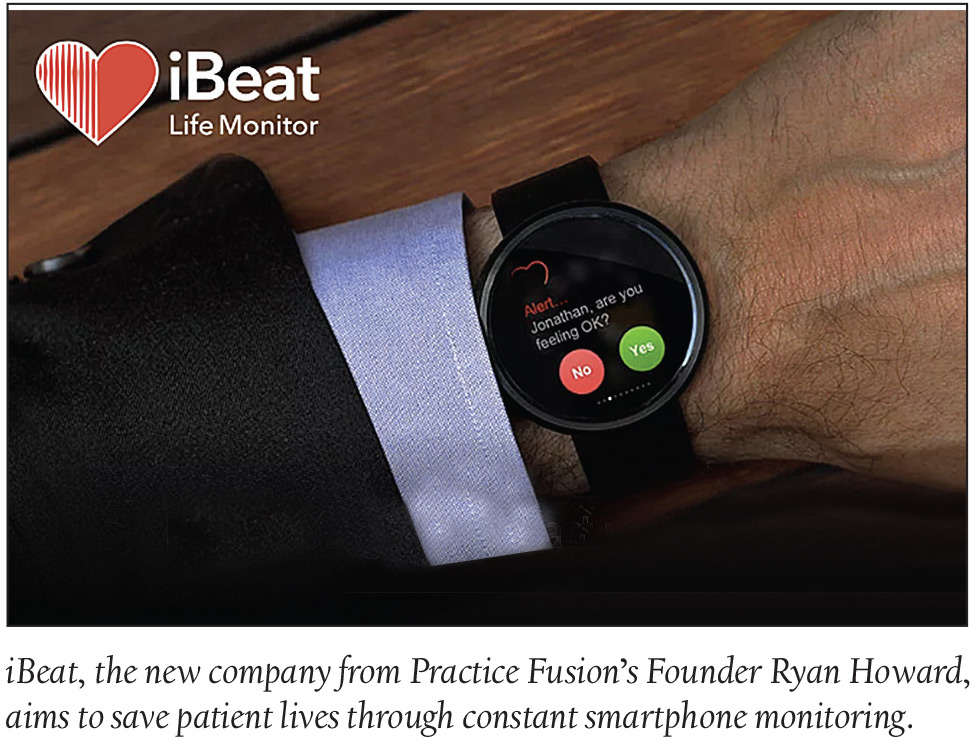Practice Fusion Founder and Former CEO Launches New Wearables Company
iBeat is a new Wearables-as-a-Service company dedicated to extending lifespan recently launched by Ryan Howard, Founder and former CEO of Practice Fusion. According to Howard, iBeat now offers a groundbreaking, heart-monitoring smartwatch called the iBeat Life Monitor and is said to be a literal lifesaver that constantly monitors heart rhythms with the goal of detecting heart attack, cardiac arrest, and atrial fibrillation. After detecting an emergency, the smartwatch will contact loved ones and emergency responders, unless the wearer cancels this action within five seconds.
“We’re incredibly excited to bring a Wearable-as-a-Service to market,” Howard said in a statement. “We believe it will be massively impactful to the community and will also have the potential to save many lives.” iBeat plans to double its staff by the end of the year and is actively seeking experienced individuals in engineering, design, growth marketing, and operations.
Theranos CEO Banned From Her Own Startup?
Theranos is under pressure from the Centers for Medicare and Medicaid Services (CMS) after failing to rectify crucial deficiencies at their California lab. The CMS sent a letter stating that CEO Elizabeth Holmes and President Sunny Balwani would be barred from operating their own lab or any others for at least two years if regulations continue to be ignored.
The CMS found five areas in which the lab fell far short of compliance standards. When Theranos launched, the owners claimed it would be more efficient than traditional testers, as it could process 70 lab tests with just a few drops of blood. Although, Holmes stated that Theranos had addressed these issues, a spokesperson from the CMS says that the $9 billion company still hasn’t done enough to rectify the problems.
How Do Patients Really See Efficacy Claims?
In a backlash against the new bill that would place a three-year moratorium on DTC ads depicting newly approved prescription drugs, industry leaders such as AbbVie and Merck are questioning FDA research of direct-to-consumer print advertising of drugs. The FDA claims marketing cues can influence consumer perception of drug quality, which in combination with efficacy claims information, can mislead consumers.
In their new studies, the FDA will analyze consumer responses to different types of efficacy claims from a fictitious drug ad, but many in the pharma industry expressed multiple concerns, including questions biased by negative attitudes towards advertising in general, or the length of the trial. The FDA has responded to each concern, saying that their prior research and expert reviewers will remove bias, make the studies fair, and even shorten the experiment.
Fingerpaint Marketing Commits $1.2 Million for Employee Healthcare
The Saratoga Springs-based marketing agency, Fingerpaint, recently announced a new initiative to cover 100% of its employees’ individual and dependent medical healthcare costs. With 150 employees, this dedication could equal a $1.2 million annual commitment. Why the generosity? “To put it simply, prioritizing our employees and recognizing their value to the company translates into superb client work and exponential growth for our organization,” says company founder, Ed Mitzen.
The corporate culture offers a team mentality that includes not titling employees, open offices, and stresses volunteering by company employees who provide plenty of charity work. Five-year employees also enjoy four weeks paid sabbatical, spot bonuses, event tickets, and milestone gifts. Fingerpaint’s generosity is partially based on an expected 57% increase in revenue each year.



